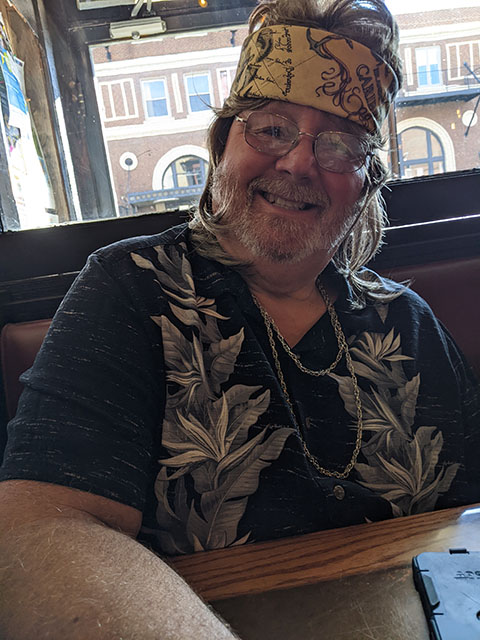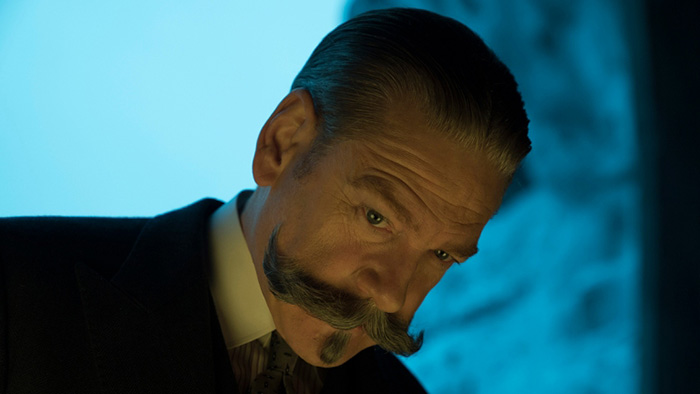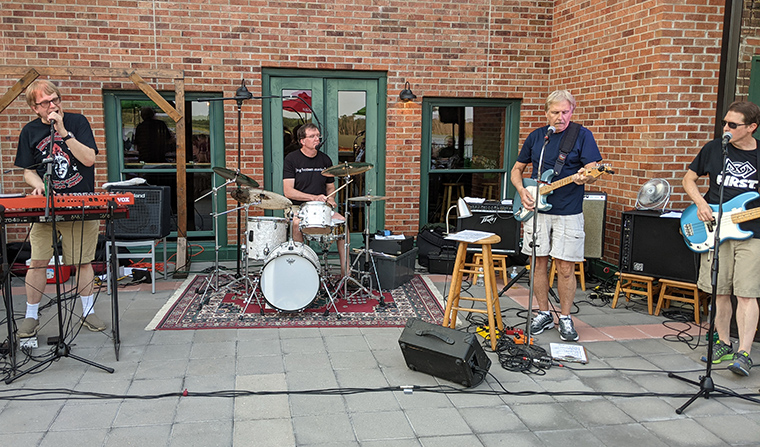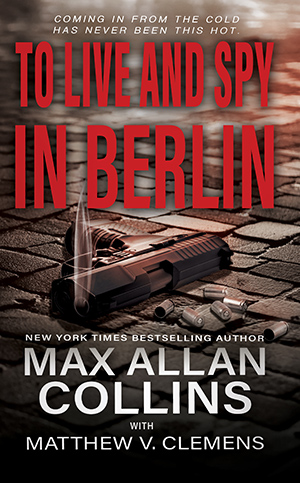This past Saturday evening (May 27) Barb and I attended the Awesome ‘80s Prom put on by my buddy Chad Bishop, who is the producer of the Blue Christmas project. Chad is a fun, funny, gifted guy and the evening he put together was a blast. There were Arcade games (a whole room of ‘em), New Wave music, food and (spiked) punch, and potential prom kings and queens trolling for votes. It’s one of those almost-a-plays that have structured elements but also have a large cast circulating as characters (prom attendees) and make it an interactive event.
We were accompanied by Barb’s sister Judy and our brother-in-law Gary, who admittedly looked a little more like he was attending the Manson Family Reunion than the Awesome ‘80s Prom.

’80s Prom Goers!

Manson Family Reunion?
J. Kingston Pierce, who for my money is the best friend the mystery/crime genre has here in the 21st Century, has posted info about the Blue Christmas crowd-funding effort – now in its final few days – that is better and more complete than I ever could:
Contributions are still being accepted here. As an incentive, if you pony up $25 to $500, Collins says you can write him at macphilms@hotmail.com to request copies of his older books to add to your collection. Click here to learn more about that offer.
Meanwhile, the author is hoping to score matching funds for this endeavor from the Produce Iowa-State Office of Film and Media’s Greenlight Grants program, which is designed to “support entrepreneurial projects that can accelerate business and careers in film.” Collins acknowledges, however, that there’s no guarantee he will succeed in this second venture, given the caliber of rival proposals. If Produce Iowa turns him down, he says he’ll mount a live production of Blue Christmas, which will be recorded.
More news on this matter to come.
Here is a link for the Rap Sheet post that includes this write-up.
Girl Most Likely will be promoted via Mystery, Thriller & Suspense Kindle book deals at Amazon, starting 6/1/2023 and running through 6/30/2023. The novel will be offered at 2.49 USD during the promotion period. If you haven’t tried one of the two Krista Larson novels, now is the time!
Fate of the Union (the second Reeder and Rogers thriller) is being offered during this same period at $3, and Flying Blind – one of my favorite Nate Heller novels – will be available at $1.99. The first of the three Reeder and Rogers novels, Supreme Justice, will be available at $2.99 for one day – June 3rd.
The great Paperback Warrior has posted a terrific review of Double Down, focusing on one of the two Nolan novels therein: Fly Paper.
Max Allan Collins’ Nolan series is his pastiche of Richard Stark’s Parker series. The third novel in the chronology was Fly Paper written in 1973 but not published until 1981. The book has recently been repackaged by Hard Case Crime in a twofer marketed as Double Down.
For the uninitiated, Nolan is a hard-nosed thief who makes a living pulling heists that inevitably run into problems. Much of this book’s focus is on Jon, Nolan’s comic book collecting sidekick. The action kicks off with a colleague named Breen, who has a good thing going with a parking meter rip-off scam. Breen was working the coin theft organized by the redneck Comfort family before those hillbillies shot and double-crossed Breen landing him squarely in Nolan and Jon’s orbit.
This leads to a plan to rip off the Comfort family in a heist-the-heisters kinda deal. The action moves from Iowa to Detroit in the shadow of a large comic book convention. The heist itself is really a side-dish in the paperback with the main course being the commercial airline getaway that is interrupted by a skyjacking.
Between 1961 and 1972, there were 159 skyjackings in American airspace with the majority between 1968 and 1972. It was a vexing criminal social contagion without a clear solution – similar to the problem America currently faces with mass shootings. Collins draws upon this phenomenon as the backdrop of Fly Paper when a married guy plans a D.B. Cooper style airplane heist with a parachute getaway.
When Nolan and Jon are coincidentally on the plane as the dude takes control of the jet, the plotting and action soar. These are the best scenes in a book I’ve read in ages. The creativity at work with the dilemma facing Nolan and Jon sets Fly Paper apart from other heist novels of the paperback original era.
Fly Paper is also unquestionably the best of the first three Nolan novels. The inclusion of Jon as a sidekick gives the book its own identity rather than just being a cover song from a Richard Stark Tribute Band. The skyjacking storyline was brilliant, and everything about his slim paperback leaves the reader wanting more. Highest recommendation.
I would take slight issue with this review only in that it describes the Nolan series as a “pastiche” of Westlake’s Parker series. I usually describe it as an homage, but Westlake himself said that the series was distinct from its inspiration by the inclusion of the surrogate father-and-son relationship of Nolan and Jon, which humanizes Nolan in a way Parker never approached (nor wanted to).
The review got me to thinking, though. The first Nolan and Jon novel, Bait Money, was designed as a one-shot and really was me trying out everything I had learned from the Parker novels – not just the heist artist aspect, but the strict Point of View approach. As some of you already know, my original version of Bait Money had Nolan dying at the end. My then-agent Knox Burger, who had always disliked that ending, encouraged me to do a different ending in which Jon came back and rescued Nolan. After the original version got six or seven rejections, the new version sold first time out.
The second Nolan novel, Blood Money, was a direct sequel to Bait Money, really the second half of the first story. The two novels have been reprinted in the single volume, Two for the Money, by Hard Case Crime.
So in a very real way, Fly Paper was my first shot at doing a Nolan novel in a series format. I would always leave dangling aspects to be picked up in later novels; but this was nonetheless a self-contained series entry. More would follow.
Don Westlake and I made several appearances together, notably at Mohunk Lodge mystery weekends (see Nice Weekend for a Murder), where in my speech to the assembled fans/mystery gamers I shared the fact that Don referred to me as the Jayne Mansfield to his Marilyn Monroe, and I corrected him, saying I was the Mamie Van Doren. I remember seeing him laughing his generous laugh in the audience upon hearing that.
Don is a friend who is gone, however vividly he lives in my memory. Mickey Spillane is gone, too, of course, though he is with me every day. So many writers I’ve known and read and liked, who I’ve gotten to know personally, are gone now – one of the aspects of being 75 that never occurred to me till I got here.
On Memorial Day I reflect on my Dad, who served in the Navy as described in USS Powderkeg, and my Uncle Mahlon and Barb’s dad Bill Mull, who both endured horrific combat and came home with memories that must have been a burden.
It’s risky for me to do this, but as I write this Update on Memorial Day, friends who have passed seem to be looking over my shoulder. I will cite some, but not all of them. A good number were in either of my two bands, the Daybreakers and Crusin’ (or both), starting back around ‘65.
Paul Thomas was my chief musical collaborator for decades in both the Daybreakers and Crusin’. He came in as a tech wizard who ran sound, developed into a fine bass player and later was our lead guitarist. He was funny as hell and it’s a rare day when I don’t think of him.
Others of my bandmates have passed and yet remain vivid in my mind. Bruce Peters, the troubled genius who was the best showman, the finest guitar player, the most incredible songwriter, and the single funniest human being I ever knew. I quote him regularly.
Terry Beckey was a great singer and bass player and also very, very funny – murdered, goddamnit, on the road. Like Paul Thomas, he came into the Daybreakers as the sound man and worked his way up to front man.
Chuck Bunn was our first real bass player, a guy who didn’t hold grudges, he cherished them. But no one was ever a better band member, putting together lighting systems and other gizmos for us in his spare time – he lived for the band. He died shortly after this appearance at Bouchercon.
Brian Van Winkle came in as the brother of our then guitar player Jim after Chuck passed. He developed into a fine bassist and performer, and was incredibly fun to be around. Like so many of my bandmates, he had a wonderful if unprintable sense of humor. He also was the gentlest and sweetest member either band ever had. He appeared with us at the Indication Concert at the Iowa Rock ‘n’ Roll Hall of Fame in 2018.
Most of my best friends – maybe all of them – have been creative collaborators. People like Phil Dingeldein, who is alive and well. But some of our film collaborators are already gone, like Steve Henke, the skinny, cranky pro who kept us honest. Steve was my chief collaborator on Caveman: V.T. Hamlin and Alley Oop.
Probably the loss among my Film Family felt most deeply is Mike Cornelison, the actor who guided me through all of my indie projects. Mike appeared in Mommy, Mommy’s Day, Real Time: Siege at Lucas Street Market, and of course Eliot Ness: An Untouchable Life. He also took the leads in four short films of mine and was the narrator of both Caveman and Mike Hammer’s Mickey Spillane. He played Pat Chambers in both of Stacy Keach’s audio productions of my scripts, The Little Death and Encore for Murder.
Mike had spent almost a decade in Los Angeles appearing on top TV shows and movies as well as starring in a trio of pilot films. He was knowledgeable in ways that turned me from a rank amateur into, well, an amateur who knows a little about what he’s doing.
On the Mommy movies, when Mike wasn’t working as an actor, he was my right-hand man, whispering in my ear when I got something wrong or needed to be doing something. He was also a pop culture expert and our conversations in that area were more fun than should be legal.
These are the friendly ghosts who walk with me through the remainder of my Act Three.
The Dave Thomas/Max Allan Collins episode of Gilbert Gottfried’s Amazing Colossal Podcast got rerun recently, and has generated some nice buzz for our novel The Many Lives of Jimmy Leighton (have you read it yet?). And let’s raise a glass to Gilbert, as well, gone way too soon.
M.A.C.














